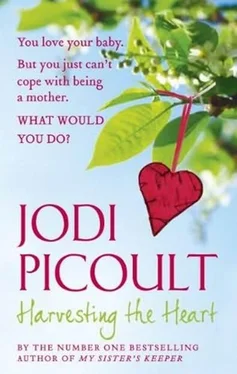My mother turned abruptly. “I didn’t mean to leave you, Paige,” she said. “I only meant to leave.”
I shrugged as if I did not care at all. But something sparked inside me. I thought of Max’s round little face and flat chin, and of Nicholas, pulling me against the hot line of his chest. I had not meant to leave them; I had only meant to leave. I wasn’t running away from them; I was only running away. I peered at my mother from the corner of my eye. Maybe this went deeper than appearances. Maybe, after all, we had more in common than it seemed.
As if she knew I needed proof, my mother whistled to the horse at the far end of the field. He exploded toward us, running at a breakneck pace, but slowed as he approached my mother. Gentling, he circled until he was calm. He nodded and tossed his head, and then he leaned down and nuzzled my mother’s hand.
He was easily the most beautiful animal I had ever seen. I wanted to draw him, but I knew I’d never be able to capture his energy on paper. “This is my best show horse,” my mother said. “Worth over seventy-five thousand dollars. This whole thing”-here she swept her hand across the vast farm-“my lessons and my training and everything else I do, is just to support him, so I can show him on weekends. We show in the elite shows, and we’ve even come in first in our division.”
I was impressed, but I did not understand why she was telling me this now when there were so many other things that needed to be said. “I don’t own this land,” my mother continued, slipping the halter over the horse’s head. “I rent from Pegasus Stables. I rent my house and my trailer and my truck from them. This horse is just about the only thing I can really say is mine. Do you understand?”
“Not really,” I said impatiently, stepping back as the horse lifted his head to dodge a fly.
“This horse is named Donegal,” my mother said, and the word brought back what it always had-the name of the county in Ireland where my father had been born, the place he never stopped telling us hiÑ€†about when I was little. Tumbling clover like emeralds; stone chimneys brushing the clouds; rivers as blue as your mother’s eyes.
I remembered Eddie Savoy saying that people can’t ever wholly give up what they’ve left behind. “Donegal,” I repeated, and this time as my mother held out her arms, I stepped into their quiet circle, amazed that the vague wisps of old memories could crystallize into such warmth, such flesh and blood.

“I spent years hoping you would come,” my mother said. She led me up the steps to the farmer’s porch of the small white clapboard house. “I used to watch the little girls walk down to the stable for their lessons, and I kept thinking, This one will pull off her riding helmet, and it’s going to be Paige.” At the screen door, she turned to me. “It never was, though.”
My mother’s house was clean and neat, almost Spartan. The porch was empty, except for a white wicker rocking chair, which blended into the background paint, and a bright-pink hanging begonia. The front hall had a faded Oriental runner and a thin maple table, on top of which was a set of Shaker boxes. To the right was a tiny living room; to the left, a staircase. “I’ll get you settled in,” my mother said, although I had never said I would be staying. “But I’ve got some lessons this afternoon, so I won’t be around much.”
She took me up to the second floor. Straight ahead at the top of the staircase was the bathroom, and the bedrooms were to the right and the left. She turned to the right, but I got a glimpse of her own room-pale and breezy, with gauze curtains billowing over the white of the bed.
When I stepped into the doorway of the other room, I drew in my breath. The wallpaper was a busy tumble of huge pink flowers. The bed was a frothy canopy, and on a chest against the wall were two porcelain dolls and a stuffed green clown. It was the room of a little girl. “You have another daughter,” I said. It wasn’t a question really, but a statement.
“No.” My mother walked forward and brushed the cool cheek of one of the dolls. “One of the reasons I decided to lease this stable was because of this room. I kept thinking how much you would have liked it here.”
I looked around the room at the sugar-candy decoration, the suffocating wallpaper. I wouldn’t have liked it as a child. I thought about my bedroom at home in Cambridge, which I didn’t like, either, with its milk-colored carpet, the near-white walls. “I was eighteen when you got this place,” I pointed out. “A little old for dolls.”
My mother shrugged easily. “You were kind of stuck in my mind at five years old,” she said. “I kept thinking I’d go back and get you, but I couldn’t do that to your father, and besides, if I went back I knew it would be to stay. Before I knew it, you were all grown up.”
“You came to my graduation,” I said, sitting down on the bed. It was a hard mattress, unforgiving.
“You saw me?”
I shook my head.ve Ñ€† “Private eye,” I said. “Very thorough.”
My mother sat down beside me. “I spent ten hours in Raleigh-Durham, trying to make up my mind about getting on that plane. I could, then I couldn’t. I even sat down on one flight and ran off before they closed the door.”
“But you came,” I said, “so why didn’t you try to talk to me?”
My mother stood up and smoothed away the wrinkles on the bedspread so that it looked as though she’d never sat down. “I didn’t go there for you,” she said. “I went there for me,”
My mother checked her watch. “Brittany’s coming at two-thirty,” she said. “Cutest little kid you’ve ever seen, but she’s never going to make it as a rider. Feel free to come down and watch, if you like.” She looked around as if something were missing. “You have a bag?”
“Yes,” I said, knowing that even if I wanted to I could not make myself stay at a motel. “It’s in my car.”
My mother nodded and started to walk out, leaving me on the bed. “There’s food in the fridge if you’re hungry, and be careful because the toilet lever sticks a little, and if you need me in a hurry there’s a sticker on the phone with a number that goes straight to Pegasus’s barn, and they can get me.”
It was so easy to talk to her. It came effortlessly; I could have been doing it forever. I supposed I had, but she hadn’t been answering. Still, I wondered how she could be this matter-of-fact, as if I were the kind of visitor she got every day. Just thinking about her made a headache come behind my eyes. Maybe she knew better and was doing this to skip all the gutted history in between. When you don’t keep looking back, it’s that much easier not to trip and fall.
My mother stopped at the threshold of the door and held her hand against the wooden frame. “Paige,” she said, “are you married?”
A sharp pain ran straight down my spine, a sick ache that came from her being able to talk about phone lines and lunch but not knowing the things a mother is supposed to know. “I got married in 1985,” I told her. “His name is Nicholas Prescott. He’s a cardiac surgeon.”
My mother raised her eyebrows at this and smiled. She started to walk out of the room. “And,” I called after her, “I have a baby. A son, Max. He’s three months old.”
My mother stopped, but she did not turn around. I might even have imagined the quiet tremble of her shoulders. “A baby,” she murmured. I knew what was going through her mind: A baby, and you left him behind, and once upon a time I left you. I lifted my chin, waiting for her to turn around and admit to the cycle, but she didn’t. She shifted her weight until she was moving down the stairs, humbled and silent, with the parallel lines of our past running cluttered through her mind.
Читать дальше













